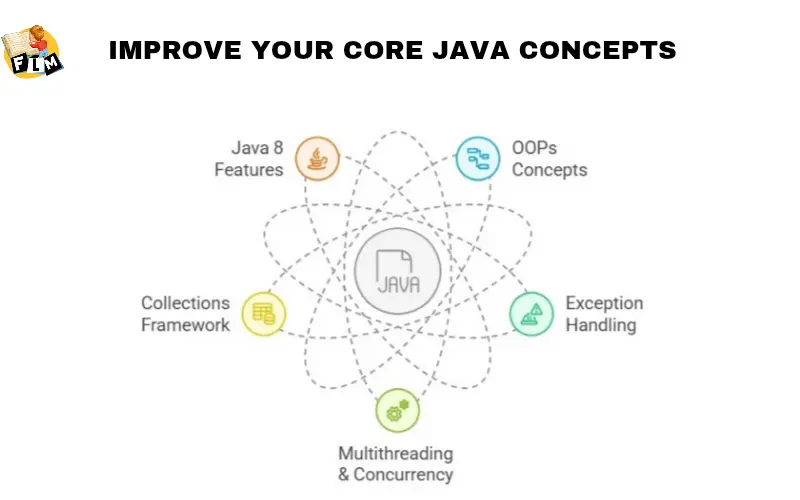Java interview preparation is the secret to landing a Java developer job. Whether you are a fresher or a seasoned one, studying key topics, solving coding problems, and being familiar with interview trends are the essentials in improving your chances of success. In this article, we will discuss the steps you need to follow to prepare for Java developer interviews and land your dream job.
Java Interview Format Understanding
Java developer interviews are standardized in nature, and they include
- Technical Screening: Online coding test or telephonic interview to determine Java basics
- Data Structures & Algorithms Session: Analytical skills are tested
- Core Java and OOPs Concepts: Java basics and standards are tested
- System Design Interview: System design patterns and architecture are tested for senior developers
- HR Interview: Communication, company culture, and behavioral screening
Understanding the interview process keeps your Java interview preparation organized
Improve Your Core Java Concepts

A good understanding of core Java concepts is a prerequisite to cracking Java developer interviews. Some of the important concepts are:
- OOPs Concepts: Encapsulation, inheritance, polymorphism, abstraction
- Exception Handling: Try catch block, custom exception, checked and unchecked exceptions
- Multithreading & Concurrency: Threads, synchronization, executor framework
- Collections Framework: Lists, Sets, Maps, Queues, and their implementations
- Java 8 Features: Streams, Lambda expressions, Functional Interfaces, Optional
Look up these concepts periodically to make Java interview preparation a cakewalk
Master of Data Structures and Algorithms
Most of the Java interviews are problem solving on data structures and algorithms. Major topics are
- Arrays and Strings: Sorting, searching, two-pointer techniques
- Linked Lists: Reversal, detecting a cycle, merging
- Stacks & Queues: Implementation using arrays and linked lists
- Trees & Graphs: Binary trees, DFS, BFS, shortest path algorithms
- Dynamic Programming: Fibonacci sequence, knapsack, subarray problems
LeetCode, HackerRank, CodeChef, or any other website on which the coding problems need to be solved, is a vital part of Java interview preparation
Know Java Frameworks
Java programmers mostly deal with web and backend programming frameworks. Hibernate and Spring Framework are few well-known frameworks whose fundamental ideas are covered in the majority of the Java interview questions
- Spring Framework: Spring Boot, Spring MVC, Dependency Injection, AOP
- Hibernate: ORM concept, caching, HQL
- JPA: Database operations, entity relationships.
Studying these frameworks will enhance your job prospects as a Java programmer
Practice Java Coding Exercises
Technical interview preparation calls for practice coding. Here’s how to sharpen your coding skills
- Solve at least one Java coding problem every day
- Write efficient code with best practices
- Participate in coding competitions on platforms such as Codeforces and TopCoder
- Learn common Java coding interview questions
Repetition practice is the best way to prepare for a Java interview
SQL and Database Management

Database management is an important skill for Java developers. Some of the essential topics to learn are
- SQL Queries: Joins, subqueries, aggregate functions
- Normalization & Indexing: Improving database performance.
- Transactions: ACID properties, isolation levels
- NoSQL Databases: MongoDB, Redis, applications
Learning databases is helpful for system design and backend development interviews
System Design and Architecture
System design is an important interview topic for senior Java professionals. Areas to improve are
- Scalability & Performance Optimization.
- Microservices Architecture & RESTful APIs
- Caching Strategies & Load Balancing.
- Design Patterns (Singleton, Factory, Observer, etc.).
System design skills are honed and Java interview preparation is enhanced by solving real projects
Practice Java Interview Questions and Mock Interviews
Master most common Java interview questions before even attempting a Java interview. Some of them are
- How are HashMap and HashTable different from each other?
- How does Java handles memory?
- How is an abstract class and interface different from one another?
- Why is Spring Boot useful?
- Explain why JVM, JRE, and JDK are needed
Mock interviews with friends or online practice on websites like Pramp, InterviewBit, and GeeksforGeeks would give that extra confidence boost.
Enhance Soft Skills and Behavioral Interview Preparation
Along with technical skills, communication skills and problem solving skills are also as important in interviews
- Speak confidently and loudly when describing solutions
- Highlight team working and cooperation skills
- Practice answers to HR questions like Tell me about yourself or Why do you want to work here?
- Utilize STAR (Situation, Task, Action, Result) format for behavior-based interviews
Effective communication skills can go a long way in Java developer interviews
Conclusion
A well organized Java interview plan boosts success chances in obtaining a Java developer position. Upon learning Java basics, honing coding problem solving skills, knowing frameworks, and gaining soft skills, you are ready to take on any Java interview. Prepare yourself today and move one step closer to your dream job as a Java developer
Beyond technical expertise, understanding real-world applications of Java, practicing mock interviews, and staying updated with industry trends can give you a competitive edge. Continuous learning, participation in Java communities, and hands-on coding experience through projects or open-source contributions further strengthen your profile
Keep in mind that each interview is an educational experience. Regardless of whether you fail the first time, review feedback, correct your strategy, and continue perfecting your skill. The Java environment is expansive, and businesses look for Java developers who can be innovative, flexible, and coding enthusiasts
Begin preparing now, remain determined, and move one step closer to getting your ideal job as a Java developer
Suggested Articles
- Essential Soft Skills for Java Developers
- Top Coding Challenges for Java Developers
- The Future of Java: Is It Still Relevant?
Future-Proof Your Career with FLM’s AI-Powered Java Full Stack Development
Java Full Stack Developer Training
Learn Java, Spring Boot, React.js, SQL, and AI automation to build powerful web applications. AI is transforming software development, and companies need skilled Java full stack developers who can integrate AI-driven solutions. This 5+ month live, interactive training will help you master real-world projects, automation tools, and industry best practices
What You’ll Gain?
- High Demand – AI Skills Give You a Competitive Edge
- Earn ₹12 LPA+ with Java Full Stack & AI Expertise
- 100% Live, Expert-Led Training
- AI-Powered Development – Automate Coding & Debugging
- 7 Major & 7 Mini Real-World Projects for Hands-On Experience
- Mock Interviews, Resume Building & Career Guidance
- Exclusive: 2-Year Recording Access for the First 100 Enrollees
- Job-Ready Curriculum with Real-World Applications
Unlock your future with FLM’s AI-Powered Java Full Stack Development — limited seats remaining! Enroll Now
Visit: frontlinesedutech.com | Click Here to Enroll
WhatsApp: 8333077727









